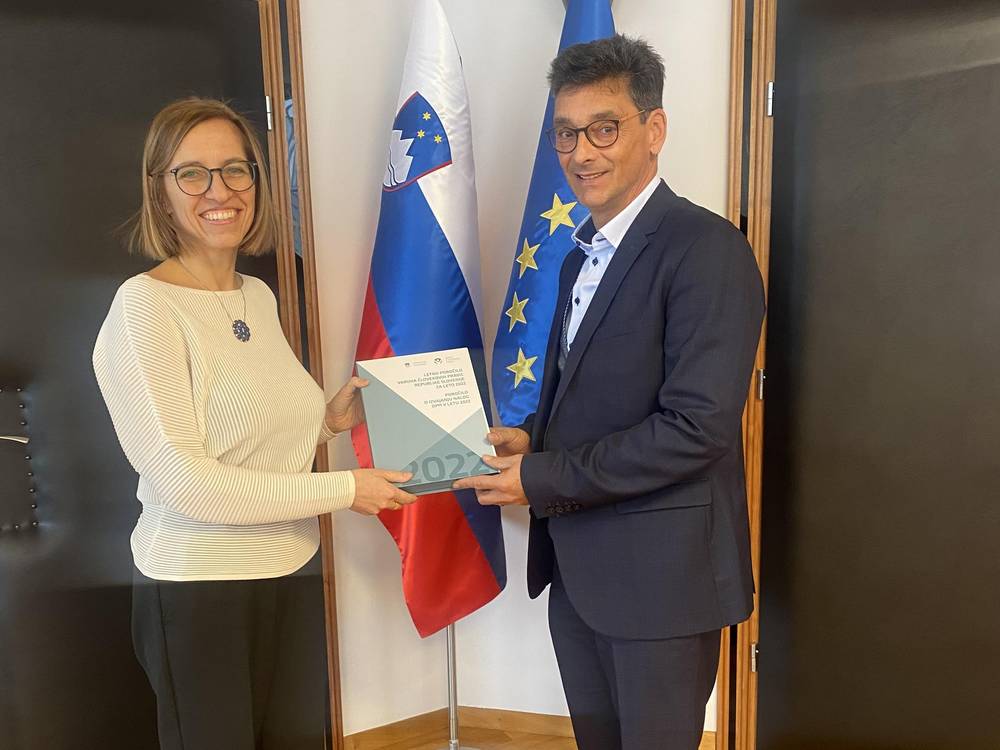On 27 November 2023, Human Rights Ombudsman Peter Svetina invited Minister of Health Dr Valentina Prevolnik Rupel for the first meeting discussing open questions in the field of healthcare. Ombudsman Svetina also presented to the Minister the recently conducted analysis on the accessibility of general and family medicine clinics.
The Human Rights Ombudsman of the Republic of Slovenia (hereon: Ombudsman) has considered several complaints related to poor accessibility of general and family medicine clinics. The complainants claimed that they have not been able to get the hold of their clinic (even after several dozen tries), some clinics do not return calls, and they also reported the constantly engaged telephone lines of some clinics. They highlighted the non-functioning or complicated electronic system for making appointments, (too) long response time of clinics to patients’ e-mails, non-responsiveness of clinics to e-mails, etc.
The Ombudsman has been warning about this issue since the beginning of the COVID-19 pandemic. The extensive Ombudsman’s analysis carried out among the majority of healthcare centres in the country showed that the accessibility of clinics has not improved in the meantime. The institution of the Ombudsman sent to all healthcare centres in Slovenia a questionnaire relating to the accessibility of their clinics of general and family medicine (clinics). The Ombudsman was primarily interested in which communication channels people can use to communicate with the clinics and how the communication is arranged for individual communication channels (in person, over the telephone, via e-mail, via the institution’s website or portal). A total of 46 healthcare centres (almost 80 per cent of all healthcare centres in the country) replied to the questionnaire.
The replies of healthcare centres revealed that great differences exist between clinics in the manner in which patients can access clinics or the ways in which they can communicate with them. “We also found big differences in responsiveness between clinics on the primary level. This is unacceptable, since everyone in the country must have equal access to healthcare services and receive the necessary healthcare measures at the time they need them,” stressed Ombudsman Svetina.
Almost all healthcare centres stated that the clinics are available for patients via telephone throughout working hours, but that actual accessibility depends on current workload of the clinics, the nature of their work, and their organisation. They have mostly abandoned communication via e-mail and started communicating via the website of the centre or web portal; however, the clinic’s response time to the message via the portal or e-mail is not uniform or defined.
The Ombudsman believes that a patient should have the possibility to send their doctor messages 24 hours a day every day of the week and that its status can be monitored. Furthermore, the longest admissible response time of a clinic to a patient’s message sent via a webpage or portal should be unified. Patients should receive an automated reply immediately after sending the message informing them not only that the message has been received but also of the maximum time in which it will be answered or processed. The Ombudsman also emphasises that we must keep in mind older people who have a poorer or no digital literacy. Making appointments with the doctor solely via portals causes numerous problems for many people, especially the elderly and digitally less skilled. Hence, healthcare centres must urgently improve telephone responsiveness of clinics and thus enable equal access to healthcare services for those patients who are not computer literate. “It is unacceptable that telephones in clinics ring in vain, that often telephone calls are not returned, and that clinics do not reply to e-mails or messages via individual portals they use for communicating with patients. The right to healthcare is a fundamental human right guaranteed by the constitution. It is not a higher standard, but the most basic right deriving from the healthcare insurance,” emphasises Ombudsman Svetina.
“One of the main tasks we embarked on at the Ministry is to ensure quality, safe, and accessible healthcare for all citizens,” said the Minister of Health, adding that the Ombudsman’s analysis is more than welcome in helping to determine the actual state of our healthcare.
She also listened to the Ombudsman’s recommendations for improving the situation and promised to organise a meeting with all stakeholders soon to discuss the topic of improving responsiveness and accessibility of general and family medicine clinics.
“A meeting can definitely be an opportunity to search for solutions to improve accessibility of clinics on the primary level and also for the transfer of best practices individual healthcare centres are already implementing. Above all, I expect those responsible to find quick and efficient solutions based on our findings, on the basis of which the unequal access to healthcare services can finally be eliminated and so that patients will have the possibility of direct communication with healthcare staff at the time they need it and in the way the patients themselves choose,” adds the Human Rights Ombudsman.
The Ombudsman and the Minister agreed to meet regularly and monitor progress.

![[Translate to English:] Varuh in ministrica za zdravje [Translate to English:] Varuh in ministrica za zdravje](/fileadmin/_processed_/8/8/csm_Vrauh_in_ministrica_za_zdravje_72459c541a.jpg)